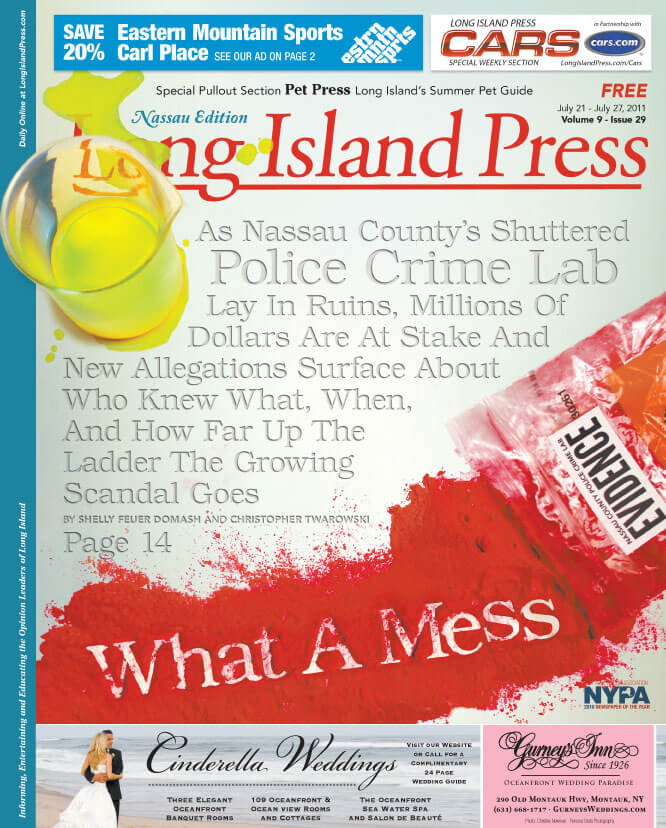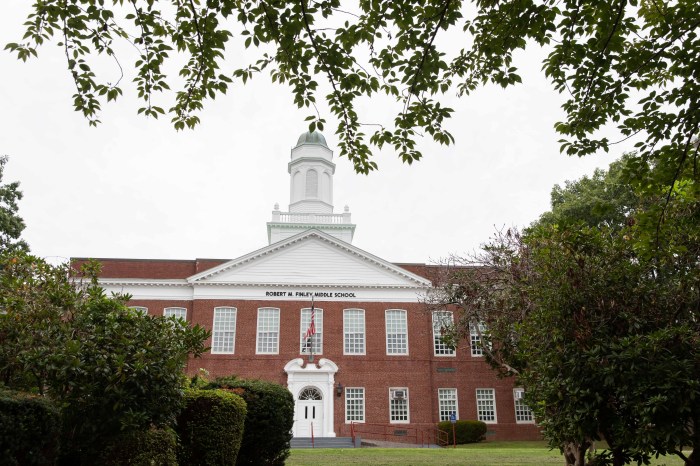
Who Knew What, When
It was 2006 and Nassau County, like most municipalities, was facing hard financial times. Every department was fighting for money, capital projects needed to be done, and within the NCPD, there was constant bickering over which project would take priority. The outdoor firing range needed to be overhauled, the communications center needed to be moved, and the lab was in what sources with intimate knowledge of its many woes call “dire straights.”
Twice weekly a staff meeting was held with only the highest ranking officers in the department in attendance. One member of those meetings, who requested anonymity due to the pending IG’s investigation, says there were “endless” discussions about the lab. They needed about $20 million to move the facility, something that some members stressed could not wait. One member of the committee stood out to at least two sources interviewed for this story. Chief Robert McGuigan, they tell the Press, who then worked in Commissioner Lawrence’s office, attended every meeting, but rarely, if ever, spoke. He had what is described as a spiral notebook in which he hand-recorded everything that anyone said during the discussions.
Upon assuming office, Mulvey made McGuigan a 1st deputy commissioner. Jay Caputo, another meeting member privy to the conversations regarding the problems inflicting the lab, was also promoted when Mulvey took over. In all, the majority of the meetings’ participants remained in high-ranking positions when Mulvey was appointed commissioner in 2007 by former Nassau County Executive Tom Suozzi to replace Lawrence [who was appointed by Suozzi in 2002].
“To think that, when Jim Lawrence was gone, that someone like Bob McGuigan wouldn’t have said to Mulvey there is a problem, I mean that is absurd,” says the member. “Also, we have Jay Caputo, he was the deputy chief of detectives when Patty O’Connor was the chief of detectives. He was there for everything. To think that he would not have said anything to anyone is just absurd.”
Attempts to reach McGuigan were unsuccessful.
It was a sentiment echoed by Mulvey’s predecessor Lawrence when contacted recently by the Press. Though Lawrence says he didn’t specifically discuss the 2006 letter regarding the lab’s myriad problems with his successor, the issues were no secret to the staff Mulvey inherited, or others.
“The people that were working for me in the lab were still working for Commissioner Mulvey,” he tells the Press. “When I was put in [as] commissioner and I came in, I sat down and I had all the division chiefs sit down and brief me about what was going on in their various [commands]. So I would have thought that [Mulvey] would have done that with the people who were working for him.
“I didn’t change the people who were working for me in the lab,” he reiterates. “I had the same chief of detectives, who was overseeing the lab, the same supervisors were in the lab when I left.”
Additionally, explains Lawrence, “There was a transition report, prepared for him [Mulvey], and I believe the issues that they brought up concerning the lab were about the needs, personnel needs, and the facilities itself. I would think that if you sat down with staff and discussed those issues, all of the historical stuff would have come out, right? Because how do you discuss the need for personnel, and the need to change the facility, without giving the background for why you need it?
“That’s what I hear: Nobody knew about it [the lab’s 2003 and 2006 problems] but me,” he laughs. “That that just defies logic, as far as I’m concerned, that I was the only one that knew about it—and I just kept it a secret in the police department.
“Do you think I could have kept a secret like that?” he asks, raising his voice. “It defies logic!”
“Do I remember sitting down and telling the county that we did this, this, this?” he continues. “No, but we discussed the lab. And I don’t see how I could have discussed the lab and the conditions in the lab without discussing the fact that we had these issues. You’re going back almost six years now, right? So I can’t remember specifics. But it’s kind of hard for me to believe—especially, when I think the last year and a half to two years I was meeting with the county executive [Suozzi] every week.”
“We told him [Mulvey] about the issues in the lab,” says Lawrence. “[And] the thing is, the lab was accredited when I left.”
Contacted by the Press, former Deputy Chief of Detectives Richard McGuire says he personally had a five- to 10-minute conversation with Mulvey soon after he became commissioner, specifically informing him about the horrendous conditions of the lab.
Additionally, McGuire tells the Press he was just finishing up a report on the lab that he had written for former Commissioner Lawrence when Mulvey assumed office. McGuire says he took that report, and instead of going through channels, he walked it directly up to Mulvey’s office.
McGuire says he personally informed Mulvey the lab was on probation, had a lot of serious issues with accrediting agencies and could be put back on probation. He also outlined the consequences of not taking action, he stresses, adding he gave the new commissioner a “quick outline of what the issues were—it was on probation, a serious chain of custody problem, not getting people certified, the physical facility was poor.”
“He brushed me off and then told Pat O’Connor [who was then Chief of Detectives] he doesn’t want to hear about the lab and has more important things on his plate,” McGuire, who eventually retired, tells the Press.
“Shortly after…the lab was removed from underneath my command,” he continues. “It had always been the line of authority of the first deputy chief of detectives, and Mulvey switched it around and gave it to Caputo [then an inspector reporting to McGuire], so as to take it out of the equation.”
McGuire adds that he and another former chief, Paul Tully, had also recommended that the head of the lab, James Granelle, be removed, but that Mulvey had asked him to stay based on mutual personal friendships.
Former Chief of Support Steve McDonald, who retired right before Mulvey took office, also attended these meetings. The “biggest ticket item,” he tells the Press, was “moving the lab and the communication center close together from Mineola to the former King Kullen in Westbury,” adding that he physically viewed the blueprints from the architects, which itemized the square footage for the lab and the communications center. He tells the Press he questions to this day why the troubled facility was never moved and where the project’s money went.
Mulvey, when asked by the Press when exactly he first became aware there were problems at the lab, repeated what he had testified to the Nassau County Legislature in the aftermath of ASCLD/LAB’s 2010 report.
“December 6th,” he responds. “I heard about it December 6th when I got that report. And we took the appropriate steps after learning about it. I was the one that set up this oversight committee. I was the one that called the DA and asked her to participate.
“I was the one that recommended this independent crime lab,” he continues. “Once we learned of the problems at the lab—I think it’s clear, and I think the IG’s Office will see—that we took all the appropriate steps of, ‘What happened? Let’s form a committee. Let’s look at it. Independent people, not police people. To make the necessary steps.’ I was the one that transferred the commanding officer of the lab.”
“Truth be told, I took the new county executive by the hands over to the public safety center,” he continues. “I told him, ‘We need a new lab here’… I was actually the motivator. Then when the lab situation broke…all he did was push forward a quicker timetable for what he and I had decided to do earlier, about eight or nine months earlier.”
Mulvey and Rice’s insisted ignorance don’t sit well with Lo Piccolo or Kephart; the bottom line being, they should have known.
“He had no regard for what’s going on under his watch,” he says, bluntly. “I believe it goes all the way to the top. And if it didn’t, then it’s kind of shameful that the people at the top had no regard or no concern for what’s going on in this area… Your job is to supervise.”
“There are intentional crimes, there are reckless crimes, there are negligent crimes,” explains Lo Piccolo. “Crimes of knowledge and not taking steps to clear it up, not taking steps to notify, those, I take as intentional. To not know, to just rely upon your supervisors, I consider negligent or reckless.
“I believe crimes are committed when people know and take no action upon it.”
































